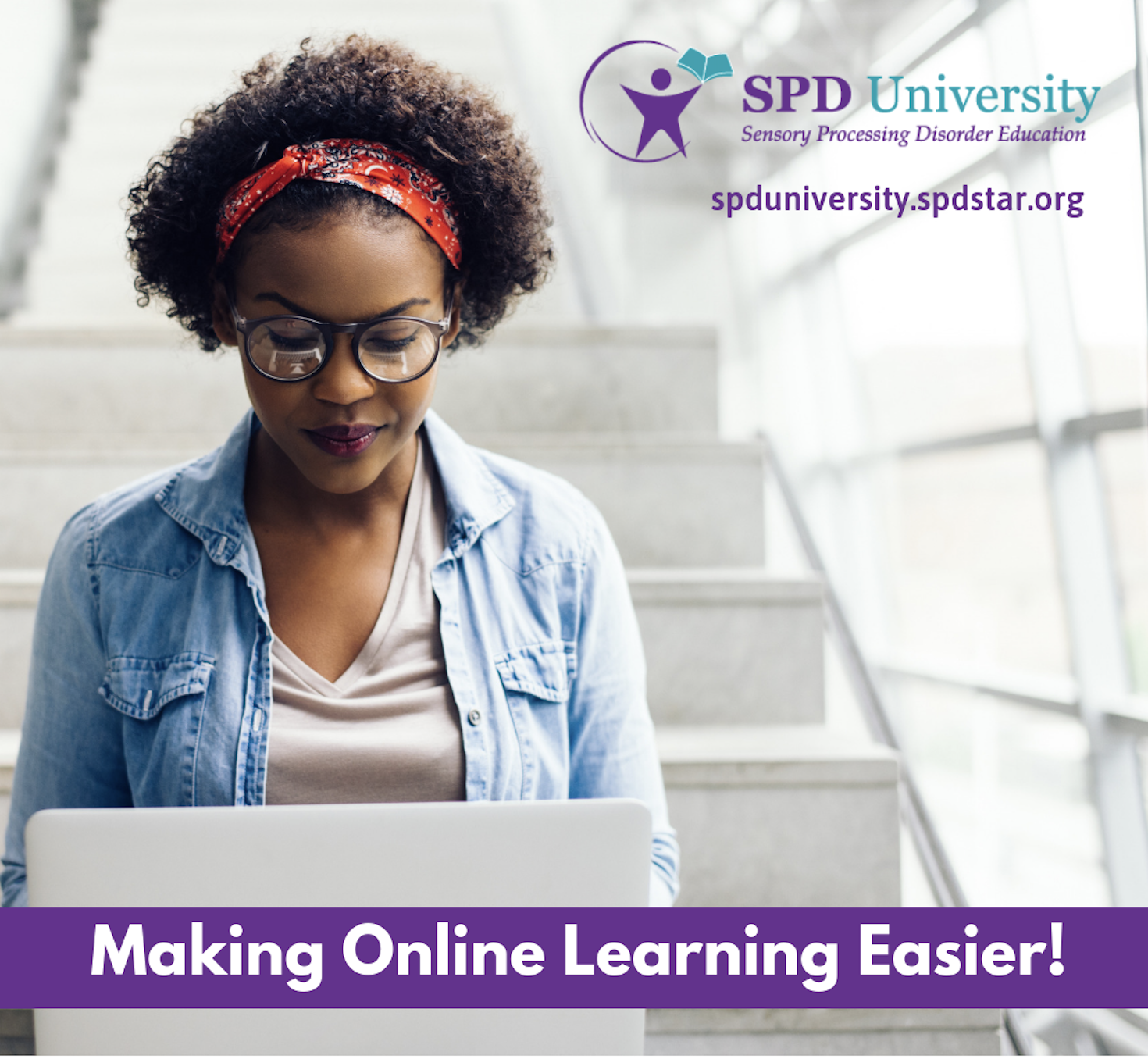
Subscribe Today and STOP Paying-Per-Course!
Get unlimited access to the best educational content on Sensory Processing Disorder, with over 60 courses available 24/7 from anywhere in the world with internet access.
OT/SLP Subscription plans also include AOTA/ASHA* CEUs. Subscription plans for organizations are available, which provides access for multiple employees of an organization at a reduced rate.
*ASHA CEUs available for SOS Advanced Courses only.
Clinical Group Supervision
by Mim Ochsenbein, MSW, OTR/L
After having practiced as a pediatric OT for 14 years, I decided to go back to school to get an MSW degree. The experience taught me a lot (especially that I love being an OT) and opened my eyes to the possibilities of supervision. In mental health, practitioners receive regular, ongoing supervision – even those in private practice. It’s not a luxury, it is a requirement. As it was explained to me by my instructors, regular supervision is completely necessary to not only examine any administrative needs a clinician may have, but also develop insights and clinical reasoning skills, and most importantly, to feel support. My world was rocked.
Supervision became so much more than a staff meeting, a time to look at schedules and caseloads or to discuss when vacation time or an educational opportunity could be scheduled. It was so much more! It was a time in which I could share gains made with a client, ask questions when I felt stuck, and process my overall experience in this helping role. And I began to ask myself, “Why isn’t this something that is a priority in OT?” Turns out, for some of us, it is.
When I finished my graduate program and returned to OT practice, I found myself eager to continue that experience. I sought out clinicians for whom I held great respect and asked them if they would be willing to act in this supervisory capacity – to help me grow. Fortunately, many said yes and I am a better clinician for it. I also made myself available to younger and newer OTs, if they felt I could be of service to them in that capacity, and found that to be tremendously rewarding.
Supervision allows us to continue to develop our clinical reasoning muscles and to refine them in the real world – in real time – not just in the echo chamber of our own heads. In supervision, you develop your questions and your answers. That means laying your therapy (and really yourself) out there. Yes, this involves being a little vulnerable, which is why who supervises you should be just as important as what the supervision covers. There needs to be trust, there needs to be room for growth, and there always needs to be a sense of support; that this person has your best interests (and those of your client) always at heart. To be honest, as a more “seasoned” therapist (i.e. having “been around for a while”), this was not always an easy thing for me to do. It can be scary, but the pay-off can be huge. Truth? I can still get anxious about having my treatment sessions viewed by my mentor, but I always leave my supervision feeling clearer and more energized.
Engaging in ongoing supervision with a supportive supervisor or mentor provides sustenance to our ever-hungry clinical appetite. Making time and space to really think about a case is, for most of us, a real luxury as we move from client to client, note to note, report to report. But it shouldn’t be a luxury. It should be as much a part of practice as evaluation, treatment, and documentation. Good, supportive supervision respects that this is a necessary part of clinical reasoning and clinician self-care. You deserve that, don’t you?
Opportunities for Clinical Group Supervision 
Bring your toughest questions and complicated cases to our new Clinical Group Supervision program for occupational therapists. This is a unique opportunity to engage in problem-solving in a collaborative model, guided by STAR-trained expert clinicians. Each group meets for five 1-hour sessions to ask, learn, and grow around their most challenging cases. Sessions are currently scheduled through December and conducted online via Zoom video conferencing.
The STAR Approach to Supporting Sensory Processing Challenges in the School
Difficulty with sensory processing affects a student’s ability to successfully participate in the school setting. Specifically, the occupational performance areas of education, play, and social participation can be impacted. This course will empower the school-based occupational therapist to effectively address sensory processing challenges in the schools through the utilization of the adapted STAR PROCESS.
1115c Searching for Stability: A Systems Approach to Postural Control in Children with Challenges
Over the last decade, postural control has increasingly been discussed as a function of the interaction of multiple systems, in keeping with dynamic systems theory. This one-hour introductory presentation begins with an overview of the literature on postural control in children with sensory and motor challenges. Several key sensory systems and their interactions are also discussed as they impact the development of postural control. Mature postural control is explored in terms of an anticipatory component and the research regarding central stability is discussed as a cornerstone of anticipatory postural control. Finally, a 21st-century approach to central stability and postural control using the dynamic nature of the systems is presented.
2115c Searching for Stability 2: Anatomy, Alignment, and Anticipatory Postural Control
In this presentation, we delve into the anatomy, architecture and recruitment of the diaphragm and pelvic floor and their relationship to mature postural control. The dynamic systems model continues to prove useful as we explore the connections between anticipatory postural control, continence and interoception. Finally, a practical exploration of 3 components of alignment will serve as a foundation for clinical assessment and treatment of anticipatory postural control.
1117c Mobilizing the Challenging Parent: Strategies to Understand and Support the Process
This presentation addresses the “why” of the challenging parent – the parent who doesn't seem to engage as expected in the therapeutic process of their child, as defined by the professional. Once we understand why parents don't engage in the professionally defined process, we will address some simple but powerful strategies to support getting parents engaged and empowered.
Upcoming Courses
Research Mentorship Program
May 1-3, 2019 • Denver, CO
Receive in-depth training from Dr. Lucy Jane Miller, Dr. Sarah Schoen, and Dr. Stephen Camarata from Vanderbilt University as you learn to initiate a research study that can be completed over the course of the next year. This program will not only launch you forward in the field of research, but it will propel forward the world’s understanding of Sensory Processing Disorder as a whole. This advanced learning opportunity that focuses on single subject research designs for studying treatment effectiveness. Obtain support and further mentoring from us during your quarterly phone meetings.
More details
Level 1 Intensive Mentorship Program
May 2-5, 2019 • Hillside, NJ
May 20-24, 2019 • Denver, CO
Working in a small-group setting, participants of STAR Institute’s Level 1 Intensive Mentorships learn to apply clinical reasoning through treatment observation, analysis and group processing/supervision with experienced therapists and faculty. Experience active mentoring before, during, and after observed treatment sessions. Sessions are scheduled throughout the year at STAR Institute and various off-site locations.
Laterality, Posture & Sensory Processing
May 4, 2019 • Denver, CO
The research on side dominance, or laterality, is rapidly advancing treatment practices in mental health as well as physical/occupational therapy— and The Reembody Method® is leading the charge. In this 10-hour workshop, join Reembody Method® founder Kevin Moore as he shows how the biomechanics of laterality can improve proprioceptive processing and movement health for adolescent and adult clients living with sensory processing disorder.
More details
Movement Medicine: A Posture and Movement Workshop
May 6, 2019 • Denver, CO
Discover the power of side dominance and how it affects the way you move, train and heal your body! Join Kevin Moore, founder of The Reembody Method®, as he explains three simple strategies that will change your posture, increase your functional strength and maybe even shift your perspective. Improve core stability, functional strength and balance.
More details
School-based Intensive for Occupational Therapists
May 31-June 1, 2019 • Franklin, MA
June 28-29, 2019 • Mt. Laurel, NJ
This intensive training course supports the clinician to gain an advanced understanding of sensory processing and integration theory, the STAR frame of reference adapted for the schools, evaluation, and various strategies of intervention. Clinicians learn to apply clinical reasoning through lectures, video treatment observation and analysis with experienced STAR faculty. Foundational information is presented via online recordings in advance of the in-person workshop. The course will end with an opportunity for each clinician to develop an action plan to take back to their own practice.
More details
SOS Approach to Feeding Conference
June 20-23, 2019 • New Orleans, LA
December 5-8, 2019 • Sacramento, CA
Expand your practice and make a difference in the lives of children with all levels of feeding challenges! The SOS (Sequential Oral Sensory) Approach to Feeding is a renowned, transdisciplinary program for assessing and treating children with feeding difficulties and weight/growth problems of all ages, with a special focus on children from 12 months to 5 years old. It integrates posture, sensory, motor, behavioral/learning, medical and nutritional factors to comprehensively evaluate and manage children with feeding/growth problems.
More details

